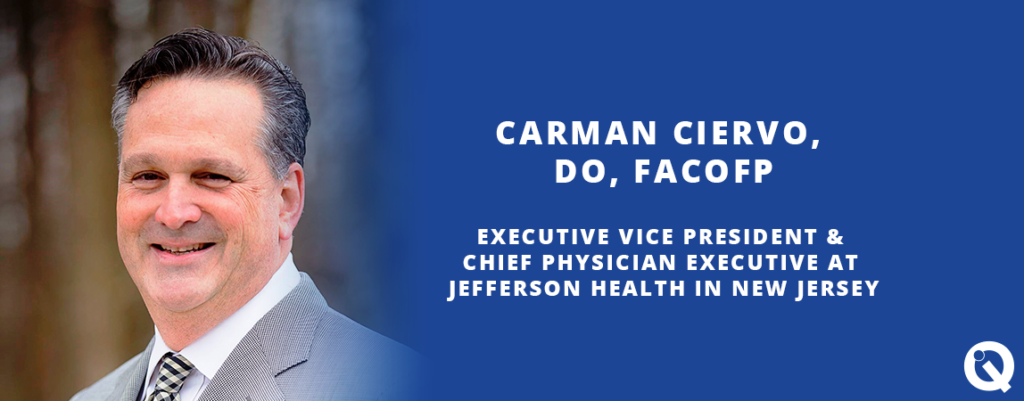Carman A. Ciervo, DO, is Chief Physician and Executive Vice President of Jefferson Health. He spoke about changes in the field of primary care.
You have been a primary care physician with Jefferson Medical Group for more than 20 years. What are changes you have seen in that time?
Care coordination and the doctor-patient relationship — so valuable in the therapeutic approach — is something that has not changed throughout the course of my career. What has changed is how people access primary care. The traditional way is that you go to the physician or clinician’s office during regular hours, you have your visit, and then you’re done. Does that still occur? Yes. But patients are looking for other avenues of access. Whether it’s telehealth or urgent care. Or the model we have at Jefferson Health in New Jersey with extended hours. People have busy schedules and want different ways to access primary care.
You’ve prioritized the integration of behavioral health services into your primary care offices. How does that investment translate into good outcomes?
Some of our patients may have anxiety, depression, and other types of phobias…or are just going through a difficult time in their life. So, we have integrated licensed social workers and licensed therapists into our primary care practices. That really allows for patients to be able to access care for their mental health needs in a much more effective way. We also have psychiatrists in our network.
Many people have to wait as long as three to six months for an appointment even if they’re willing to pay out of network —let alone trying to find a psychiatrist or a therapist who actually accepts your insurance. We’ve found that integrating behavioral health into our primary care brings a more holistic approach in caring for our patients. There are great benefits of getting the patient the right care they need so they can live more fulfilling and productive lives.
Have you incorporated substance abuse treatment into your primary care model?
That’s another of our major initiatives. Jefferson has really taken a lead whereby Dr. Bruce Meyer, President of Jefferson Health, has committed to making sure that all of our primary care providers are trained to provide buprenorphine. It’s an eight-hour course. It just opens up the number of providers who can help patients when it comes to dealing with the opioid crisis, which is very real.
What other innovations have you incorporated into your primary care model — and how are they helping patients?
I think very often, as a patient, it can be overwhelming if you have three or four medical conditions like diabetes, hypertension, and chronic obstructive pulmonary disease and you go to your primary care physician and they may say, ‘You need to see a pulmonologist. You need to see a cardiologist. And you need to see an endocrinologist.’
One of the things that we’re very proud of that we’ve done at Jefferson is we’ve developed an integrated care management team, which helps patients navigate all this and helps them get appointments to other specialists, as well as following up with them to make sure that they understand the instructions that they got from the specialist so that they’re able to follow through and maintain healthy lives.
You’ve said you wish your patients would talk to you more about their end of life desires. What steps has Jefferson taken to more closely work with patients on advance care planning?
We are making a conscious effort to talk to our patients — no matter what their ages are — and ask if they have a living will. What are their personal preferences and beliefs? What do they want to happen if they are facing the end of their lives?
When you don’t have these conversations and the patient is unable to make decisions on their own, and nothing has been documented, it puts a heavy burden on either their significant other or their family to try to make assumptions about what their loved one would have wanted. And sometimes what we find is the family doesn’t want to engage either palliative or hospice care. And instead the patient will go through additional testing and other probably unnecessary medical care that really is not going to enhance their quality of life.

